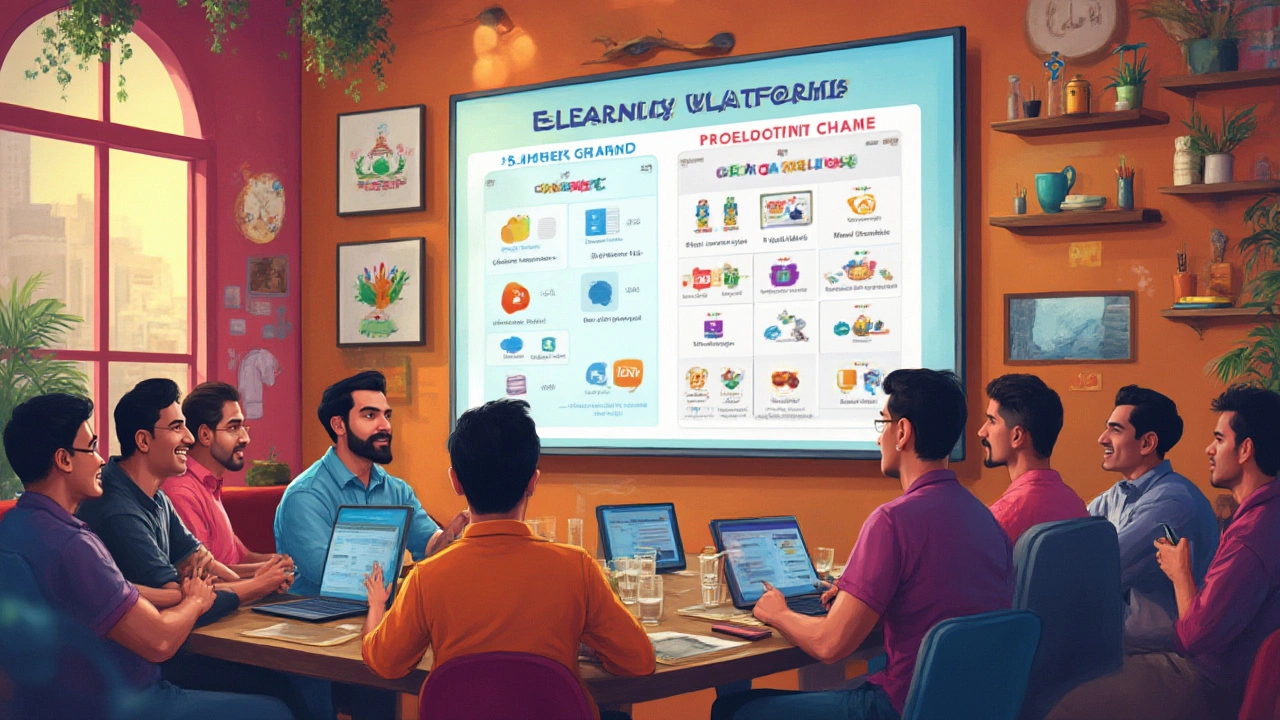
Remember when learning meant chalkboards and sitting in rows all day? That feels ancient now. Today, eLearning platforms are everywhere and making serious waves. Whether you want to master a new language, pick up coding, or just brush up on high school math, there’s a platform that’ll suit your style and your schedule. And get this — over 1.6 billion people used online learning platforms worldwide in 2024. That’s not just a trend; it’s a revolution in how we learn.
How eLearning Platforms Change the Game
You log in from your couch, coffee in hand, and take a business analytics course taught by a Yale professor. All before 9 a.m. This is the power of eLearning. Traditional classrooms have their charm, but they can’t compete with learning that adapts to your life, instead of the other way around.
These platforms aren’t just dumping videos in your lap. Most have interactive quizzes, live sessions, discussion forums, and completion badges. There are platforms like Coursera and edX giving you access to Ivy League-level material. Graphic designers flock to Skillshare for quick, practical lessons. Corporate employees upskill with platforms like LinkedIn Learning. It doesn’t stop at subjects — the whole approach changes. You often get to decide the pace, repeat lessons as needed, and usually pay much less than a semester’s tuition at a university.
Here’s something wild: a Harvard study found that students using eLearning platforms actually get higher recall rates than those in traditional classes, mostly because people learn best when they set their own pace. And developers aren’t sleeping on accessibility or adding snazzy new features. Got a disability? Most platforms are packed with translation, captions, or navigation tweaks so you’re not left out.
The Heavy Hitters: Popular eLearning Platforms You Should Know
The range of eLearning platforms out there is enough to make your head spin. But a few names keep coming up, and for good reason. These giants have figured out what modern learners crave—flexibility, diversity, credibility, and engagement.
- Coursera: If you want university-level courses at home, Coursera’s a top pick. They partner with schools like Stanford and companies such as Google. You can enroll for free, or pay for credentials and even full degrees. In 2024, Coursera reported over 126 million users. Their professional certificates are especially hot for people jumping careers, like switching to data science or project management.
- edX: Started by MIT and Harvard, edX is a nonprofit with serious academic clout. They offer everything from micro-degrees to full graduate programs. One thing users love: lots of material is accessible free (audit mode), and you only pay if you want a verified certificate. edX merged with 2U, Inc. in 2021, so now there’s a greater push into job-relevant skills and employer partnerships.
- Udemy: Want variety? Udemy is a marketplace loaded with courses on everything from Photoshop to Pilates, usually designed by individual experts, not universities. With more than 213,000 courses and 62 million learners, Udemy caters to hobbyists, professionals, and the simply curious. Price tags are friendly, and there are frequent sales giving you access to top-rated content for under $15.
- LinkedIn Learning (formerly Lynda.com): This is the go-to for business, creative, and tech courses that double as résumé polishers. The integration with LinkedIn is slick; you can show prospective employers exactly what you’re learning. In 2024, over 27 million people had active subscriptions.
- Khan Academy: Free, forever. This non-profit made a name with math but now covers sciences, arts, history, and even test prep. Khan Academy is favored by parents, schoolkids, and anyone looking for bite-sized explanations—in fact, my cousin relies on it for SAT prep. Everything is broken down into video snippets that even the most distracted teen can follow.
Let’s break that down with a quick numbers snapshot:
| Platform | Number of Users (2024) | Number of Courses | Access Model |
|---|---|---|---|
| Coursera | 126 million | 10,000+ | Free & Paid |
| edX | 44 million | 3,000+ | Free & Paid |
| Udemy | 62 million | 213,000+ | Paid, often discounted |
| LinkedIn Learning | 27 million | 20,000+ | Subscription |
| Khan Academy | 135 million | 10,000+ | Always Free |

Specialized eLearning Platforms: Beyond the Basics
The big names tend to cover broad ground, but what if you’re chasing something niche? There’s a specialized eLearning platform for practically every interest, and some have cult followings in their niches.
If you’re into creative skills, you can’t ignore Skillshare. This platform is bursting with courses in illustration, video editing, cooking, and even animation. Their class projects and active community are a magnet for those who want to learn by doing, not just watching. I know photographers who swear by it—not for the degree, but for the up-to-date, practical techniques.
Coding has exploded, so naturally, there are dedicated options like Codecademy and freeCodeCamp. Codecademy’s interactive lessons walk you through building websites, apps, and data structures. freeCodeCamp is 100% free and takes a project-driven approach; learners even contribute to open-source projects after gaining skills. Last year, freeCodeCamp announced that more than 40,000 graduates landed developer jobs after completing courses.
Language learning platforms deserve a shout as well. Duolingo is famous for its gamified smartphone app, and people stick with it because it’s playful and addictive. If you want a richer experience, Babbel offers deep dives into grammar and cultural lessons too.
Test prep platforms have carved out major space too. Platforms like Magoosh, PrepScholar, and BYJU’S (especially booming in India) offer tailored prep for everything from SAT and GRE to UPSC and IIT JEE. These aren’t just piles of practice questions—they include live tutoring, analytics, and performance tracking. During the pandemic, BYJU’S doubled its userbase to more than 150 million in India, which just shows how massive online prep has become.
Here are a few more specialties you might stumble across:
- Teachable – For creating your own course and selling it online, which is a game-changer for independent instructors.
- Pluralsight – Serious software engineering, IT, and cybersecurity content, popular for corporate teams and professionals.
- Alison – Free diploma and certificate courses ranging from business leadership to health and safety.
Choosing the Right eLearning Platform for Your Goals
There’s such a dizzying range of eLearning platforms, picking the right one can feel overwhelming. But after years bouncing from one to the next (Aisha always teases me about my never-ending Udemy wish-list), I’ve figured out a few guiding questions that help narrow your search.
- What’s your end goal—certification, career move, hobby, or just learning for fun?
- Do you need a course with official recognition, like a degree or accredited certificate, or is practical know-how enough?
- How much structure do you want? Some platforms drip-feed material or have deadlines; others are totally self-paced.
- What’s your learning style? Love interaction and community? Try a platform with active forums and group projects. Prefer going solo? Many offer private study with optional peer support.
- Is mobile access crucial for you? A few platforms like Duolingo and Khan Academy set the gold standard for mobile-friendly learning, so you can squeeze lessons into your commute or while waiting in line.
- Are you on a budget? Khan Academy and freeCodeCamp are always free. Udemy and Skillshare run deep discounts. University-backed platforms might get pricey if you go for full credentials, but plenty let you audit the material at no charge.
And don’t underestimate the community vibe. Some platforms, like Skillshare, thrive because of the feedback and creative projects. Others focus on one-on-one teacher support (think VIPKid for live language teaching). If you’re easily distracted, look for platforms with reminders, gamification, or daily streaks to keep you hooked.

Interesting Tips, Must-Know Facts, and Stats
The eLearning platform world is changing fast, and a few key facts can make all the difference as you explore.
- The pandemic pulled digital education into turbo mode. By 2025, the global eLearning market is expected to hit $457 billion, according to Statista.
- Completion rates for online courses used to be low—often under 15%—but mobile-friendly platforms, interactive content, and shorter course lengths are finally tipping that higher. Microlearning (short, focused lessons) leads to 60% better retention, according to a recent LinkedIn Learning report.
- User reviews can be gold—real feedback from past students helps spot quality (or red flags) fast. Always check the ratings and sample lessons.
- Many companies are ditching traditional résumés for skill-based hiring, especially in tech sectors. That means certificates from platforms like Coursera, Google Career Certificates, or AWS can seriously boost your profile.
- Stuck on a concept? Forums and community Q&A (like Stack Overflow for coding or Reddit study groups) make it way easier to get unstuck than suffering alone.
- If you pick the right platform, you’ll never be stuck with boring, out-of-date lessons. Most are updated constantly—Coursera’s partnerships with Google, IBM, and Facebook mean you stay on top of industry trends, which is crucial if you’re trying to land a job.
- Accessibility’s improving—captioned videos, translations, screen reader support, and offline access are now standard on the best learning platforms.
- Avoid ‘course overload’—start with one platform and a few courses, then branch out after you get your rhythm.
Getting the right fit can take some trial and error. But once you tap into the world of eLearning platforms, you’ll find yourself picking up skills you never thought possible—from calculus to salsa dancing. Set your screen, grab your favorite snack, and plug into one of the most exciting shortcuts to learning the world’s ever seen.
